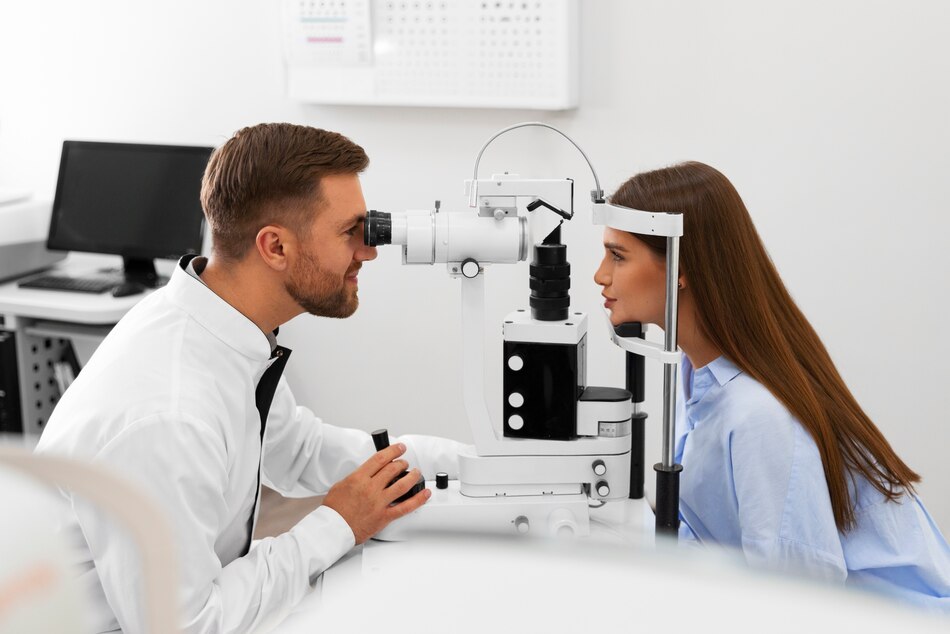Light must be converted into visual signals that the brain can understand by the retina, a tiny layer of tissue at the back of the eye. Keeping your retina healthy as you age is essential to keeping your eyesight clear. Below are some techniques to help safeguard your eyes from common retinal issues.
- Maintain a Healthy Diet
The health of the eyes can be greatly impacted by a well-balanced diet high in necessary nutrients. For retinal health, antioxidants, omega-3 fatty acids, and vitamins A, C, and E are especially helpful. If left untreated, retinal conditions such diabetic retinopathy, macular degeneration, and retinal detachment can seriously impair vision and possibly result in blindness. Consult with the best diabetic retinopathy clinic Chennai to check the eye condition.Rich in lutein and zeaxanthin, leafy greens like kale and spinach help shield the retina from light-induced damage.
Omega-3 fatty acids, which are abundant in fish like salmon and sardines, may lower the incidence of macular degeneration.
Antioxidants like vitamin C and E found in citrus fruits and almonds help prevent oxidative stress, which can harm the retina. - Regulate Blood Sugar Levels
Controlling blood sugar levels is essential for diabetics to avoid diabetic retinopathy, a disorder in which elevated glucose destroys the retina’s blood vessels. Regular monitoring of blood sugar, following prescribed medication, and maintaining a healthy lifestyle will considerably lower the incidence of retinal problems. - Wear Protective Eyewear
Sunlight exposure that contains ultraviolet (UV) radiation raises the risk of macular degeneration and other retinal problems. One simple technique to keep your eyes safe is to wear sunglasses that completely filter UV rays. Additionally, use safety goggles if you operate in areas where there are threats to your eyes, like construction or lab work. - Give Up Smoking
There is evidence connecting smoking to a higher incidence of retinal illnesses, including AMD (age-related macular degeneration). The toxins found in cigarette smoke have the potential to harm the blood vessels in the eyes, which would reduce the retina’s access to oxygen and nutrients. The risk of AMD and other eye-related disorders can be considerably reduced by quitting smoking. - Keep an eye on cholesterol and blood pressure
Poor circulation and damage to the small blood vessels in the retina can result from high blood pressure and cholesterol levels. This can eventually lead to disorders such as hypertensive retinopathy or retinal degeneration. A good diet, regular exercise, and regular check-ups with your doctor can all help manage these risk factors and safeguard the health of your retina. - Regular Eye Check-Ups
Retinal health is maintained mostly by early detection and prevention. Making an appointment for regular eye examinations at Sankara Eye Hospital with an optometrist or ophthalmologist might help detect possible problems before they worsen. Your eye doctor can identify potential retinal issues during these examinations, even in the absence of symptoms, enabling prompt treatment.7. Stay Active
Engaging in physical exercise might enhance circulation generally, which helps the eyes by guaranteeing they get adequate oxygen and nutrients. Frequent exercise also aids in the management of risk factors that are associated with retinal issues, such as high blood pressure, diabetes, and cholesterol. - Set Screen Time Limits
Extended usage of digital screens can cause eye strain and raise the chance of developing retinal problems in the future. The 20-20-20 rule, which states that every 20 minutes, one should gaze at an object 20 feet away for 20 seconds, can help reduce eye strain and safeguard the health of the retina.Conclusion
For you to continue having great vision throughout your life, your retinal health is essential. By adopting a healthy lifestyle, scheduling frequent eye checkups, and taking preventive actions like wearing protective eyewear, you can dramatically minimize the risk of retinal illnesses. Taking good care of your eyes now will contribute to improved eyesight in the future.


